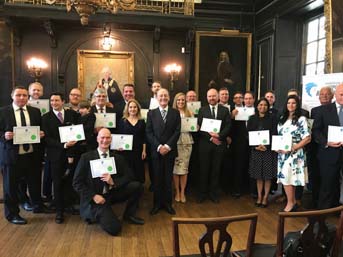History was made on Wednesday, May 23, the Association of Super Recognisers writes.
The first 20 qualified licentiates of the Super Recognisers Association were awarded their certificates of admission, having completed their training course and examination. The ceremony took place in the magnificent Apothecaries Hall, in Blackfriars Lane, in the City of London.
Apothecaries are traditionally at the heart of the development of new drugs and formulations. This award ceremony marked a new formulation seeking to combat crime and extremism. Technology is bounding ahead at an unprecedented pace and automated facial recognition systems are being developed and deployed across the security spectrum. There has been much discussion in the press recently regarding the use of facial recognition systems recording false positives, for example at the Notting Hill Carnival.
We also know that some of these automated intelligence systems are good but are not yet perfect. Society, parliament and civil rights groups will demand more certainty and confidence than that provided only by a machine before committing someone to detention. The judiciary will need certainty and confirmation of identity. This is one area where Super Recognisers come into their own.
The information watchdog warned recently of a loss of public trust in police facial recognition technology, as figures from the biggest force showed that 98 per cent of “matches” found by the software were wrong. Elizabeth Denham also disclosed that she is investigating the proportionality of forces holding 19 million images on the police national computer of people photographed when taken into custody. The images include those never charged with an offence.
A recent report by Big Brother Watch called for use of facial recognition software by the police to be abandoned. Figures revealed to the privacy campaigners in response to a freedom of information request showed that, for the Metropolitan Police, 98 per cent of “matches” were wrong, and for South Wales Police the figure was 91 per cent.
The Super Recognisers Association comes into play with its Code of Conduct and Global Standard, setting the bar for performance, training and the integrity essential to build trust and confidence in the unique skills of those gifted with Super Recogniser skills. The Police have used Super Recognisers for many years with the Metropolitan Police Service being the first in the World to have its own Super Recognition unit. Super recognisers can be deployed to help make event venues safer by recognising drug sellers and tick touts, they can help secure our borders and prevent crime such as shoplifting which costs business, and ultimately shoppers over £7m per year.
These rare people, with their unique skill of facial recognition may well be the answer to the problem of false positives of the automated systems – the deployment of a human Super Recogniser can vastly reduce the error rate and help to build public confidence in the modern technology.
Much academic study has gone into looking at what makes a Super Recogniser led by Dr Josh Davis of the University of Greenwich.
The future for Super Recognisers looks very promising both in the UK and overseas. Super recognition has an increasingly important role to play in gathering evidence, confirming identification, building the intelligence picture and preventing crime. Now professionally monitored by the ASR, the science is rapidly expanding to address the rising crime figures and challenges of organised crime.










